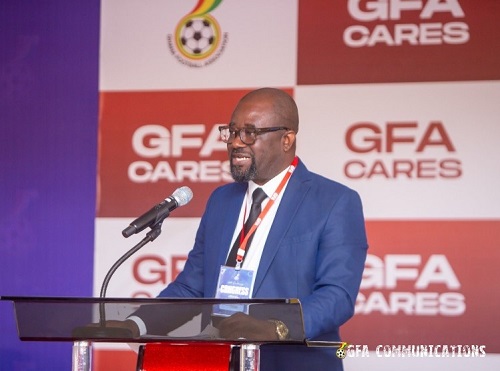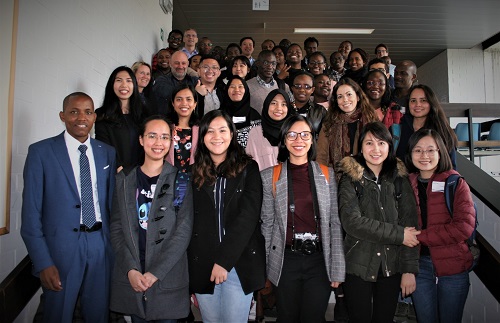A Shiny Black Star Missing in the hands of a game changer – Barak Mintah Brown Writes

The Black Stars of Ghana have historically stood as a formidable force in African Football. The inaugural victory in the AFCON in 1963 marked the beginning of a legend that has continued with impressive runs in the World Cup in 2006 and 2010. This is one national team that, for many years, has represented pride and motivation. However, since 2019, some decline had set in, and performances by the Black Stars went on to raise serious concerns about the future of the team both in continental and global stages. In October 2019, Kurt Okraku took over as the president of the GFA with high hopes that he could revive the sport within the country. Following the notorious Anas exposé in 2018, which saw the dissolution of the previous GFA administration, Okraku emerged as a beacon of reform and, indeed, a new chapter in Ghanaian football. However, 5 years into his tenure, a large pool of football stakeholders-from the numerous fans to analysts-start to raise several questions as regards the growth of Ghanaian football under his watch. These range from the performances of the national teams, especially the Black Stars, to the state of the local leagues and, more broadly, the administration of football in Ghana.
Ghanaian domestic football, particularly the GPL, has seen quite rough times during the tenure of Okraku. The league is still plagued by thin attendance, small sponsorship deals, and invisibility at the international level. Even with reassurances by Okraku over reforms and improvements, the GPL has not been able to realize such interest as in times past, with current television coverage among the lowest in the continent. Still another ongoing major concern under the presidency of Kurt Okraku is the underperformance of Ghana’s national teams. The senior men’s representative side, popularly known as the Black Stars, has had poor returns at both the regional and international levels. Indeed, two of the most disastrous recent tournaments for the Black Stars were the 2021 and 2023 African Nations Cup tournaments, where the team was eliminated in the group stages without recording a single win-an all-time low for a team that has been tagged as one of the powerhouse teams on the continent. Not being able to progress through such stages in any serious tournament has brought up a number of questions as to where the team is headed, and whether the leadership provided by the GFA is appropriate.
The performance of the Black Stars at the 2022 World Cup held in Qatar was not much different. The team could manage only one win in the group stages of the tournament and were subsequently knocked out after the third match. This immediately felt shamefully inadequate and, therefore, a reflection of poor planning and decisions by the GFA under the watch of Kurt Okraku when weighed against Ghana’s once-prestigious football tradition, which usually saw them through to the knockout rounds at previous World Cups. Be that as it may, other Ghana national teams-the Black Satellites, Ghana U20, and Black Starlets, Ghana U17-have equally disappointed in making their mark in international competitions. What used to be considered a strong developmental pipeline for Ghanaian football has grown disjointed, with fewer talents coming through the ranks that would compete on the international stage. While Ghana still manages to turn out individual players who go on to prosper in various European leagues, there seems to be a lack of coherence in terms of development pertaining to the national team itself. Youths development systems and local leagues, which hitherto proved fertile ground to find top talents, have decayed. This has slowly but surely led to an evident lack of connection between the local league and the national team setup.
The constant changing of coaches has been one of the significant reasons for the struggles of the Black Stars. Ever since Kurt Okraku took over in 2019, the managerial changes have run in cycles with the national team-from the return and subsequent exit of Kwesi Appiah to the tenure of C.K. Akonnor, the reappointment of Serbian coach Milovan Rajevac in 2021, and the brief stint of Otto Addo during the 2022 World Cup qualifiers. Then came Chris Hughton, formerly of Brighton and Hove Albion, only to make way for the permanent reinstatement of Otto Addo. And with each coach introducing different tactical philosophies and methodologies, none were able to solidify the team’s identity or create a consistent style of play that Ghana could follow. This has brought instability on the technical bench, as the players have struggled to adapt to the changes that have now become frequent, hence erratic performances and an absence of a long-term strategy regarding the development of the national team. The fall of the Black Stars since 2019 underlined one key concern-the issue of talent development.
This compares rather unfavorably with other African nations like Senegal and Morocco, for example, who have clear routes to growth and have built strong squads around their burgeoning talents. Finding this balance between youth and experience has long been a problem of Ghana. Still-persistent issues regarding FIFA-standard stadiums, poor infrastructure, and governance woes within the GFA make things very complicated. Under Okraku’s administration, the GFA has had to bear the full weight of its external reputation, buoyed by allegations of mismanagement and favoritism. The decisions concerning player call-ups, particularly with respect to national teams, have been questioned by both fans and stakeholders; indeed, aspersions have been cast that some called-up athletes do so through connections rather than genuine merit. Whether well-founded or not, such perceptions have contributed toward dissipating trust in the operations of the GFA and have caused divisiveness among its fans. But this is something that warrants an immediate address, since the future of Ghana football is at stake.
There had been a sustained issue over transparency with respect to the GFA’s financial dealings. Though Okraku’s administration promised change and transparency during his campaign, it has come under criticism for failing to make known the financial details associated with sponsorship deals and the use of funds. This perceived lack of transparency raised concerns for many as to whether the GFA had an interest in Ghanaian football or if it was serving just a few. This question gains relevance with the progress of Kurt Okraku’s term, whether these promises of transformation and moving forward were indeed empty rhetoric. This would concern poor performance of national teams, disorganization in local leagues, and a general underdevelopment in Ghana’s football ecosystem. The Black Stars have won only ten out of thirty-seven matches in the last three years, with just two wins from the eleven games played this year. For the first time in twenty-four years, this afternoon, the Black Stars have tasted defeat at the feared Baba Yara Sports Stadium and find themselves in an unexpected precarious position of failing to qualify for AFCON 2025-a competition the country hasn’t missed in two decades.
What Ghana actually requires is a proper reform package in football, highlighting a rebuilding of its structures right from the grassroots to professional levels. The need for new leadership and transparency in administration, infrastructure development, and a clear-cut policy in talent development are essential to make sure Ghanaian football gets back to pride of place in Africa and the world at large. The demand for change rings unmistakably loud and clear. If Okraku aspires to leave a meaningful legacy, he must be willing to come through the shortfall of his administration and undertake its fixing in these later years of his tenure or run the risk of being remembered as the president who presided over the most challenging periods in Ghanaian football history. Though sloganeering and empty rhetoric may look convincing, they certainly do not result in victories on the pitch. How does a nation wanting to win the AFCON struggle to qualify?



